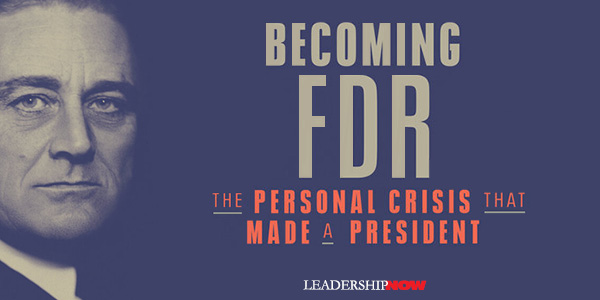 |
 |
10.24.22

Becoming FDR: The Personal Crisis That Made a President
WHEN FEAR and suffering are all around us, how does a true leader inspire hope? asks author and journalist Jonathan Darman. He found the answer not in his presidency but in the years leading up to it. In an insightful book, Becoming FDR: The Personal Crisis That Made a President, Darman pulls back the curtain of Franklin’s personal tragedy to reveal the character and the change in perspective that he developed as he faced his diagnosis. In popular memory, Franklin Roosevelt is the quintessential political natural, a president with greatness in his blood. He was indeed born with many advantages—wealth, charm, and intelligence; loving attentive parents; and a famous cousin who was president of the United States. Had he never gotten polio, those things could have delivered him a life of achievement and accomplishment. Aligned with luck and timing, they might have even brought him to the White House someday.
It was sad that “His speeches were pleasant to listen to, but when he was done speaking, it was hard to remember anything he’d had to say.” Franklin was on track to follow in his cousin Theodore Roosevelt’s footsteps all the way to the White House. But on Wednesday, August 10, 1921, Franklin’s life changed forever. At the age of thirty-nine, he was diagnosed with Polio. He could have just quietly faded away, but he chose to believe in the possibility of a full recovery. Franklin used “his powers of feeling, perception, and intuition to create a foundation of hope.” In the early days of a serious illness or injury, the mind is destabilized.…Hope is the scaffolding that protects the traumatized mind….Pain becomes more bearable when it has a horizon. Suffering is more survivable when it has the promise or even the possibility of an end. And recovery seems more possible when it is spelled out in a detailed plan. His former lifestyle had prevented him from deep thinking. “Convalescence meant he could no longer search for distraction at the first hint of a difficult or uncomfortable idea.” A political aid that lived with the Roosevelts, Louis Howe, remarked Franklin “began to see the other fellow’s point of view. He thought of others who were ill and affected and in want. He dwelt on things which had not bothered him much before. Lying there, he grew bigger by the day.” In 1924, Franklin learned of a man that had regained his ability to walk after three years of therapy in the warm springs near the town of Bullochville, Georgia. Franklin believed. “The more time he spent there, the more he was awakened to what other people who had polio—most of whom were less fortunate and connected than he—had gone through.” Warm Springs did not bring his legs back to life, but they did awaken in him an “awareness of other people’s pain, and awareness of his own ability to ease it.” Gather the best available wisdom. Focus on practical action. Strengthen community. Nurture hope. These had been the cornerstones of his own attempts at recovery, and Franklin replicated then at Warm Springs. Later, when faced with the challenge of lifting his country out of an economic crisis that had spread dire terror and hopelessness throughout the land, these same principles would form the backbone of his response. His years of convalescence would shape his response to the nation’s crisis when he took office as the president in 1933. “Need and adversity, he now understood, not only caused suffering; they also robbed people of the dignity and purpose that comes from feeling useful.” His support of the Civilian Conservation Corps and the Works Program Administration was to that end—restoring dignity and purpose. “At the heart of Franklin’s relationship with the American people was his unique ability to envision their fears, hopes, and needs.” Years before, his Uncle Fred wrote to him—never worry, accept things as they are, look forward and not back—became his message too. In his inaugural speech, he told Americans, “the only thing we have to fear is fear itself”—they believed because they knew he deeply believed it. Although he kept much of the details of his illness private, they knew when he spoke of the struggle against fear that it was his fight too. 
Posted by Michael McKinney at 06:47 AM
|
BUILD YOUR KNOWLEDGE
 

How to Do Your Start-Up Right STRAIGHT TALK FOR START-UPS 
Grow Your Leadership Skills NEW AND UPCOMING LEADERSHIP BOOKS 
Leadership Minute BITE-SIZE CONCEPTS YOU CAN CHEW ON 
Classic Leadership Books BOOKS TO READ BEFORE YOU LEAD |